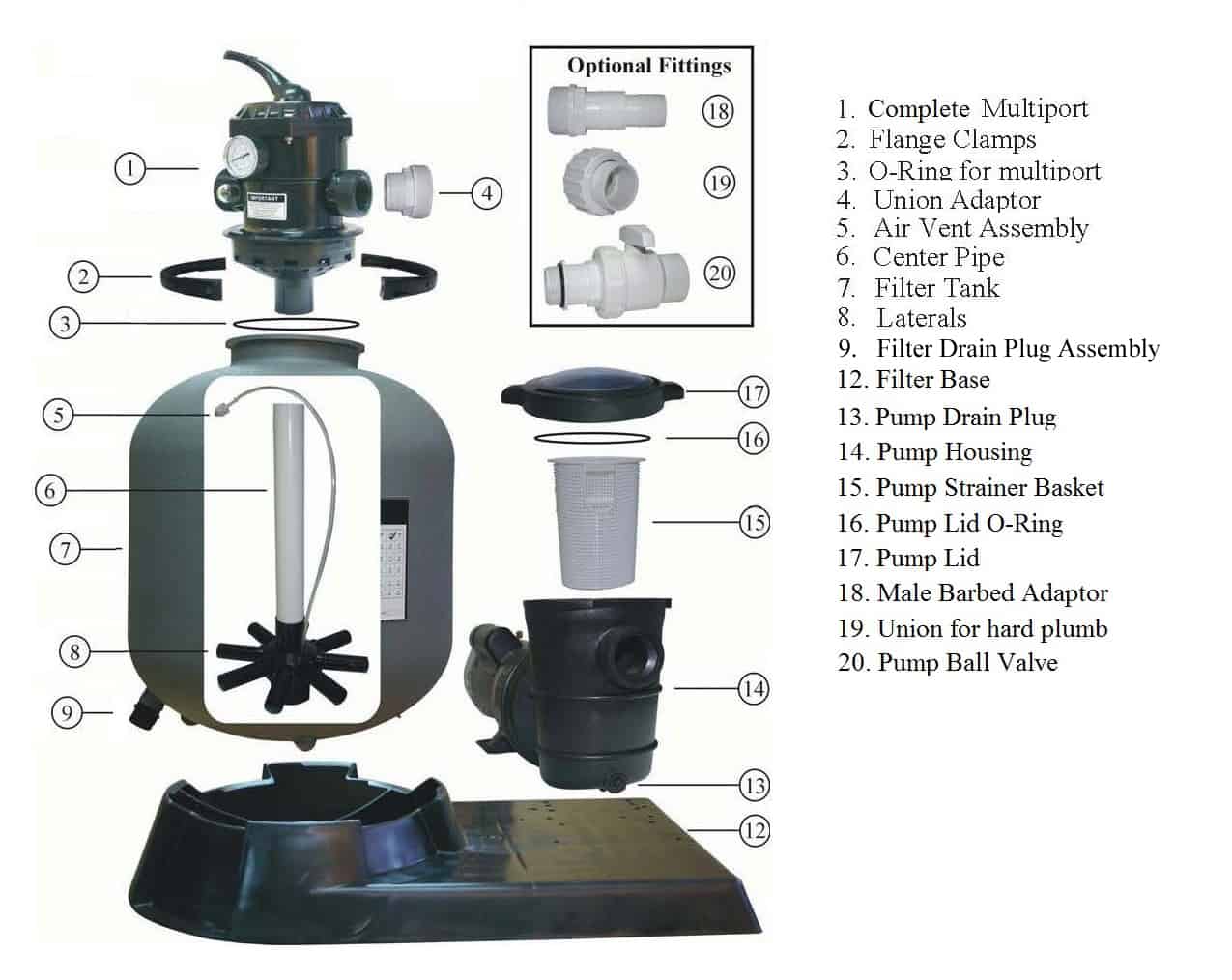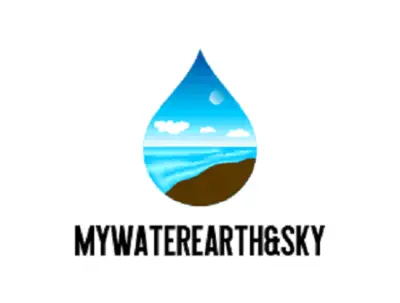In some areas of the country, lower freezing temperatures are slow to happen and not as common, which can give Pool Owners a choice on when or if to close their pool. In other areas, cold weather can happen overnight. How do you protect pool equipment from freezing?
- Backwash & rinse filter
- Open all drain Plugs on a Filter system
- Blow out Filter system using a compressor or a wet vac
- Pull the Pump Motor & store
- Disconnect D.E. Filter & store
- Cover the Sand Filter with a Weather blanket
Or
- Run Filter when temperatures get close to freezing
- Use Freeze Protection Units
The expansion of freezing water causes intense pressure on pool equipment and plumbing lines. They often crack or break open under the pressure, resulting in costly repairs. Proper Draining of the Filter system or keeping the water moving can be of the utmost importance to keep the water from freezing.
Winterizing Pool Filter
The main procedure for preventing any damage to your pool, whether it’s Inground or Aboveground, is to ensure the entire Filtering System is drained of water. This water will freeze depending on the location and area you are in and crack any exposed pipes, pumps, and equipment over the winter.
So make sure you properly drain the system. Starting with the filter.
Lower the level of the pool
- Remove the Skimmer Baskets & Jet Fittings
- Remove the Drain Plug Assembly and Drain the Filtering system
- Hook up a small compressor at the bottom of the Pump Filter Drain and set the Multi-Port Valve to Recirculate
- Make sure to Open the Valve for the Skimmer Lines, then blow out the line using the compressor with low pressure.
- Turn on the compressor and blow out the Skimmer lines
- As you do this, have a partner stay at the skimmer, and when they see air blowing out of the line from the compressor, close off the line with an expansion rubber or a plastic plug.
- Suck out the remaining water with a wet vac. Plug up the skimmer line
Close off the Skimmer Line - Blow through the Main Drain at the bottom of the pool. When you see air at the bottom of the pool coming from the compressor, you’re done.
- Turn the compressor-Close off the valve
If you have 2 Skimmer Lines, then do the same with that one.
You can also open the Main coupling and or Ball Valve that attaches the suction lines and discharge line from the pool at the filter and use a wet vacuum by switching the suction hose on the vac to the discharge air. You can blow out the lines from the filtering system through the suction and discharge lines on the pool.
Open the Pump Lid and store small drain plugs and the pressure gauge inside the Pump Housing until spring.
This can work well as long as the level of the pool water is dropped underneath the discharge jets inside the pool. This will blow out any water remaining in the PVC pool’s lines preventing them from cracking in colder temperatures.

Can I Leave My Sand Filter Out All Winter
Sand filters can be and should be left outside. Backwash one last time and drain the entire system. If you follow the Draining procedure steps above, it will be fine. I pull the Pump Motor and keep that in the garage, protecting it from the elements. That’s optional. I keep the Multiport and collar on. Remove the Backwash hose and store it to save them for next season.
For D.E. and Cartridge filters, it is important to soak the fingers/grids or cartridge in a filter-cleaning solution. Fill a clean trash can with water and pour the correct amount of Filter Cleaner into the water. Submerge your fingers/grids or cartridges to give them a good cleaning. As it is the end of the season, let the filter soak for at least 24 hours.
- For D.E. Filters, you should remove your fingers/grids or cartridge from the cleaning solution. Spray off the filter one more time and allow it to dry.
- Reassemble your D.E. or cartridge filter, making sure to plug all open holes in the filter. This keeps small animals from living in them during the winter. using expansion plugs.
- Store your D.E. or Cartridge Filter in the basement or garage, if possible. If you store your filter in a shed or a detached Garage, make sure you cover it and keep it away from chlorine or any corrosive chemicals that are off-gas.
Should I Cover My Pool Equipment In The Winter
Pool Pump coverings have come a long way and can be beautifully built to enclose your whole filtering system, although it’s not necessary to enclose pool equipment; most pool filters are built to be outdoors, and many pool owners like having something to hide or cover the pool filter called a Weather Blankets.
This keeps snow and freezing rain off the electrical parts of the motor and pumps if you decide not to pull it- just cover it.
As long it is taken care of and properly winterized at the time of pool closing, it need not be covered. You need to drain the entire system, which will be the greatest protection for your pool’s equipment and keep it lasting many seasons.
Pump motors can develop rust deep inside the motor, which can keep the motor from working come springtime. Keeping pumps away from accumulating moisture, assuming you live in a place with considerable rain/snowfall during the long winter months, is a good way to protect the equipment. Filter Wraps are available that protect the system, but again I’m more concerned with the Pool Pump Motor, and you should be too. Protect it.
If you are not handy when it comes to basic electrical work and you want to pull your pump’s motor and store it take a look at this site step by step procedure for disconnecting the motor from scratch. HOW TO DISCONNECT THE ELECTRICAL CONNECTION TO A POOL PUMP MOTOR
Running Pool Pump in Freezing Weather
The expansion of freezing water causes intense pressure on pool equipment, especially the pool filter and plumbing lines. They often crack or break open under the pressure, resulting in costly repairs. Turning your pump and heater on when temperatures drop keeps pool water moving from becoming stagnant in equipment and plumbing.
In turn, this helps eliminate the chance of freeze damage. With some Risk!
Freeze Protection Units sold here on Amazon –This Intermatic PF1202T Control System with Freeze Protection and Power Center with Two T104M Mechanisms is on sale
allowing pool and spa owners to set the desired temperature where their pump and heater will automatically turn on. Once the climate drops to the specified temperature, the Freeze Protection Unit kicks in. It turns on your pump and heater to keep the water moving, which prevents freeze expansion.
- If you live in the areas of the country that won’t see freezing temperatures for most of the winter, then maybe.
- But you would need to run pool pumps continuously 24-7 even if you have a heater to control the pool water temperature; there are just too many things that can go wrong.
- If you live in Southern California or the Keys or, at the very least, areas with moderate temperatures, well, yes.
- If you don’t have Freeze Protection Units professionally installed, the NO.
These heavy-duty Freeze Protection Controls are designed specifically for pools requiring one or two time switches and protect the pool and spa equipment and plumbing against freeze damage. They turn the pump and heater ON when the outdoor temperature drops below the temperature set by the user-adjustable thermostat. In addition, they have a provision to install switches inside or GFCI receptacles on the side of the enclosure.
How to Increase Pool Pump Pressure
For more great articles on increasing pool pump efficiency and keeping your pool in excellent balanced health stay here at MyWaterEarth&Sky-If you lose pressure (PSI) on your pool pump then water won’t be flowing through the filtering system at a designed rate and the pool water won’t be filtered or ………..… Continue reading
Jim Galloway/ Author/Editor

References:
The Importance of Winterizing Your Pool Filter
